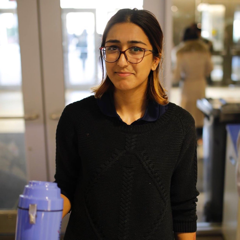
Priyanka Sharma
Law students wear many hats, and at Osgoode, many students also wear the hat of being community organizers. I had the honour of interviewing 12 JD students about their involvement in various social justice movements and community initiatives this past year. Here is an overview of their work.
Priyanka Sharma (1L) is a community activist who is involved in a number of movements. Prior to attending law school, they completed an undergraduate degree and Master’s degree in Criminology and Sociolegal Studies. Priyanka highlighted her involvement in advocating with Toronto Rape Crisis Centre/Multicultural Women Against Rape (TRCC/MWAR), a grassroots women and non-binary run collective supporting survivors of sexual violence through an anti-oppressive and feminist approach.
Priyanka’s involvement in anti-sexual violence work through TRCC/MWAR has included “crisis-line counselling, facilitating volunteer training, organizing marches like Take Back the Night, and serving on the collective board.” One major challenge this year, she explained, was “dealing with the provincial government’s cuts to rape crisis centres and its effect on TRCC/MWAR, particularly to front-line counselling, education, and activism.”
TRCC/MWAR activists, Priyanka said, “work towards a world that is free of violence, that celebrates the freedom of choice, sexual freedom, and healthy communities and relationships. They imagine the liberation of all women, trans, non-binary people, and children from all forms of violence.”
Priyanka spoke about TRCC/MWAR’s commitment to listening to and taking instructions from survivors: “it leads from the understanding that survivors are the experts of their own lives and healing – and this assertion really resonates with me. This means that those involved in providing services to survivors – counsellors, police, lawyers, and media – are not the experts in discussing how to eradicate sexual violence. Placing expertise in those with lived experience is a fundamental reminder for me about who are the actual leaders of social movements. In this case, it is the collective of survivors that are leading the fight towards liberation of women, trans, non-binary people, and children.”
“As a law student, I am reminded that the communities we do legal work for don’t need us, but rather we need them for our collective liberation against institutional, hetero-patriarchal, and racist violence.”
When asked how their community involvement informs their work as a law student, Priyanka offered this thoughtful response. “While my community activism definitely directs how I navigate my work as a law student, it doesn’t go the other way. I actually don’t think being a law student adds any value to community organizing, other than providing some specific knowledge about technical legal matters or explaining the realities of the legal system. Yes, sometimes that specific knowledge is valuable; but at the end of the day, lawyers will not be the ones to eradicate sexual violence. In fact, lawyers, the law, and legal actors are too often found maintaining and reproducing the systems of oppression that enable sexual violence.”
She acknowledged as sources of motivation and inspiration “the fierce, humble, and bad-ass queer women and non-binary activists at TRCC/MWAR” who, she says, constantly challenge and share knowledge with her.
“From my work, I know that everyone’s lived experience of crisis, violence, trauma, and life is very different – survivors are not a homogenous group. This makes the need to work through an anti-oppressive lens all the more important – this lens means being self-reflective about my own social location in relation to the social location of those I work with. I translate this knowledge into working at clinics and communities as a law student, whether it’s currently working at the Trans ID Clinic based at SKETCH Working Art and The 519, or working at Parkdale Community Legal Services soon.
“I also bring those principles beyond legal work and try to practice them in the everyday with my fellow peers – understanding that we all come from a variety of different life experiences that affect how we process the world today. It reminds me that empathy and holding space can go a long way.”
Priyanka drew upon the work of Professor Kim TallBear to articulate the notion that those who are able to do community work “should frame their work as ‘standing with the community’ instead of giving back to the community.’”
“In standing with community,” she said, “I recognize that I still have my own self-work to do in dealing with violence and healing as I hold space for others to also do so, whether as an activist at TRCC/MWAR or as a law student.”
“The value of organizing in community is actually practicing transformative justice in our daily interactions and maintaining collective accountability to each other and our chosen families.”
